

Self Reflection Essay
Self reflection essay generator.

What goes through your mind when you have to write a self reflection essay? Do you ponder on your life choices, the actions you take to get where you want to be or where you are now? If you answered yes and yes to both of the questions, you are on the right track and have some idea on what a reflection essay would look like. This article would help give you more ideas on how to write a self reflection essay , how it looks like, what to put in it and some examples for you to use. So what are you waiting for? Check these out now.
10+ Self Reflection Essay Examples
1. self reflection essay template.
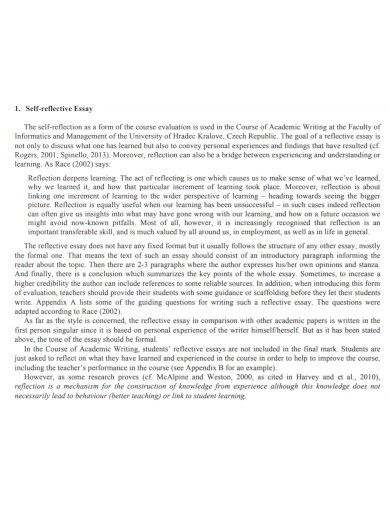
Size: 27 KB
2. Project Self Reflection Essay
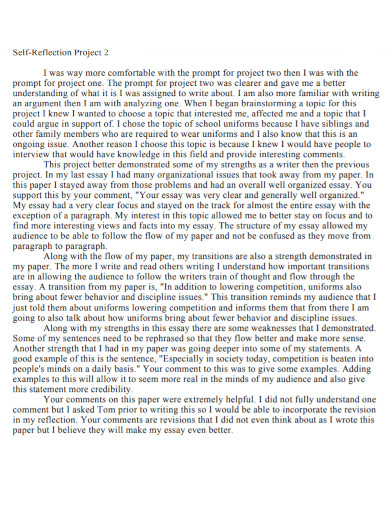
Size: 35 KB
3. Final Self Reflection Essay
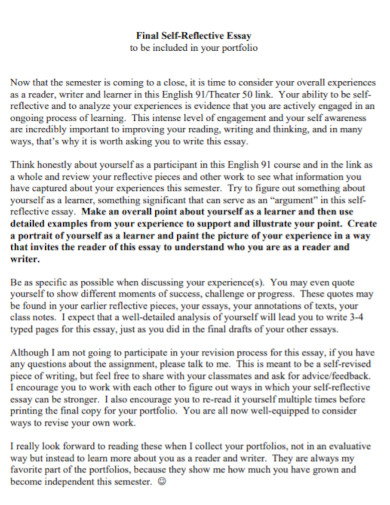
4. Internship Self Reflection Essay
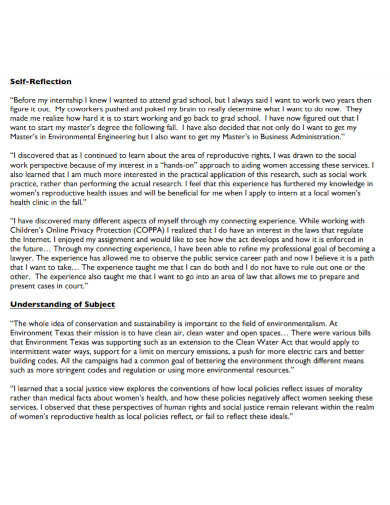
Size: 36 KB
5. Student Self Reflection Essay
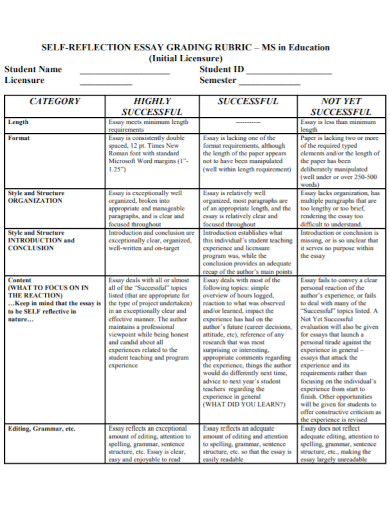
Size: 267 KB
6. Basic Self Reflection Essay
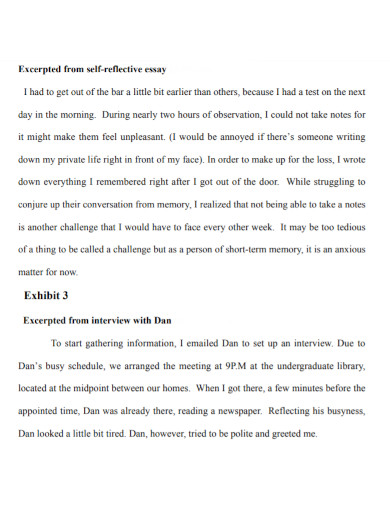
Size: 123 KB
7. College Self Reflection Essay
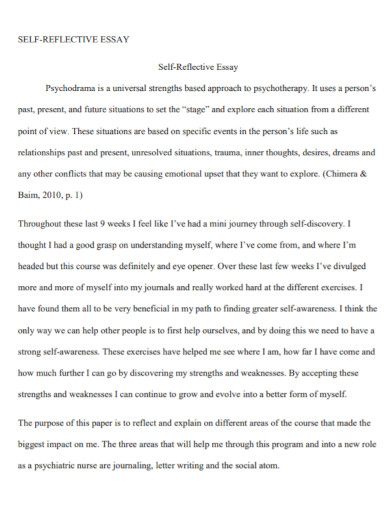
Size: 256 KB
8. Self Reflection Essay Rubric
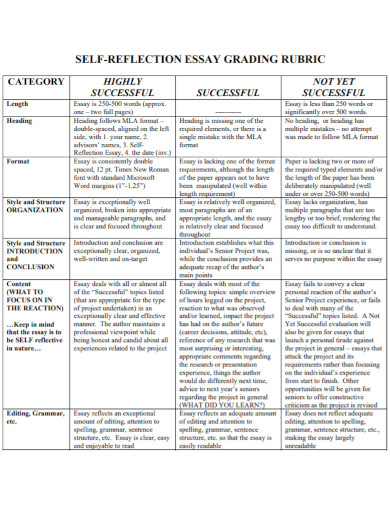
Size: 16 KB
9. Standard Self Reflection Essay
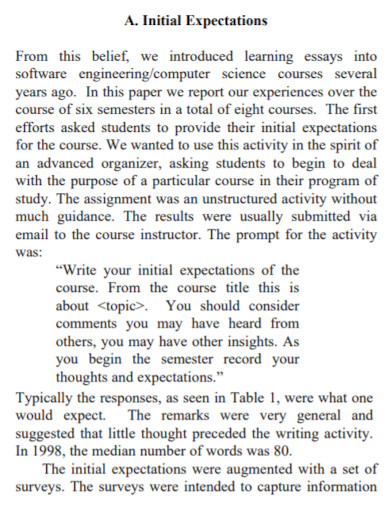
Size: 30 KB
10. Persuasive Essays Student Self-Reflection
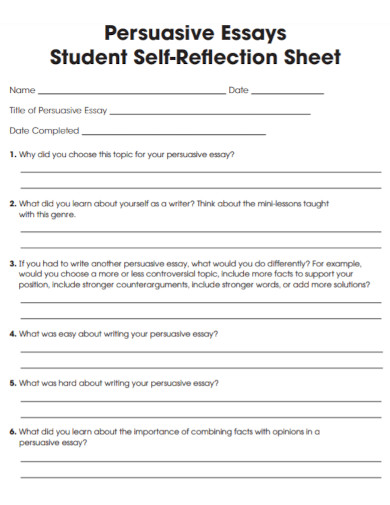
Size: 24 KB
11. Self Reflection Essay in Higher Education
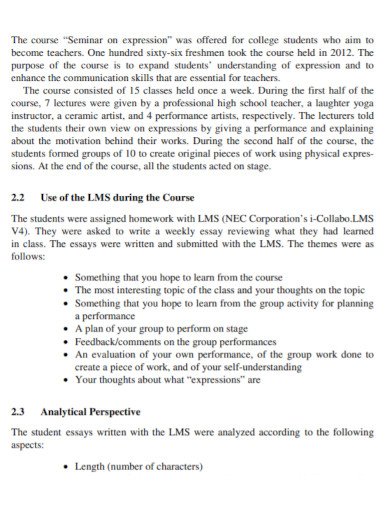
Size: 139 KB
Defining Self
A person’s self that is different from the rest. On occasions it is considered as an object of a person’s view.
Defining Self Reflection
A self reflection is often described as taking a step back to reflect on your life. To take a break and observe how far you have become, the obstacles you have gone through and how they have affected your life, behavior and belief.
Defining Self Reflection Essay
A self- reflection essay is a type of essay that makes you express the experiences you have gone through in life based on a topic you have chosen to write about. It is a personal type of essay that you write about. It makes you reflect on your life and journey to who you are today. The struggles, the fears, the triumphs and the actions you have taken to arrive at your current situation.
Tips on Writing a Self Reflection Essay
When writing a self reflection essay, there are some guidelines and formats to follow. But I am here to give you some tips to write a very good self reflection essay. These tips are easy to follow and they are not as complicated as some might believe them to be. Let’s begin. To write a good self reflection essay, one must first do:
- Think : Think about what you want to write. This is true for the title of your essay as well. Thinking about what to write first can save you a lot of time. After this tip, we move on to the next one which is:
- Drafting : As much as it sounds like a waste of time and effort, drafting what you are preparing to write is helpful. Just like in the first tip, drafting is a good way of writing down what you want and to add or take out what you will be writing later.
- State the purpose : Why are you writing this essay? State the purpose of the essay . As this is a self reflective essay, your purpose is to reflect on your life, the actions you did to reach this point of your life. The things you did to achieve it as well.
- Know your audience : Your self reflection essay may also depend on your audience. If you are planning on reading out loud your essay, your essay should fit your audience. If your audience is your team members, use the correct wording.
- Share your tips: This essay gives you the opportunity to share how you have achieved in life. Write down some tips for those who want to be able to achieve the same opportunity you are in right now.
How long or short can my self reflection essay be?
This depends on you. You may write a short self reflection essay, and you may also write a long one. The important thing there is stating the purpose of you writing your essay.
Writing a self reflection essay, am I allowed to write everything about my life?
The purpose of the self reflection essay is to reflect on a topic you choose and to talk about it.
Is there a limit of words to write this type of essay?
Yes, as much as possible stick to 300-700 words. But even if it may be this short, don’t forget to get creative and true in your essay.
A self reflective essay is a type of essay that people write to reflect on their lives. To reflect on a certain topic of their life and talk about it. Most of the time, this type of essay is short because this is merely to take a step back and watch your life throughout the beginning till the present time. Writing this type of essay may be a bit difficult for some as you have to dive deep into your life and remember the triumphs and the loss. The beauty of this essay though is the fact that you are able to see how far you have reached, how far you have overcome.
Text prompt
- Instructive
- Professional
Write a Self Reflection Essay on a time you overcame a personal obstacle.
Reflect on your personal growth over the last year in your Self Reflection Essay.
How to Write a Self-Reflection Essay: A Comprehensive Guide [2025]
Sep 3, 2024 | 0 comments

Sep 3, 2024 | Blog | 0 comments
Writing a self-reflection essay can be both a rewarding and challenging endeavor. This type of essay allows you to delve into your personal history, exploring your thoughts, feelings, and experiences in a structured manner.
Whether you’re a student tasked with writing a reflective essay for class or someone looking to document a significant life event, understanding how to write a self-reflection essay is essential.
Typically, these essays vary in length, but they should always maintain a clear focus on your personal reflections and insights. Literature often serves as inspiration, providing examples of how to effectively convey emotions and lessons learned.
In this article, we will guide you through the process of writing a reflection paper that not only meets academic standards but also resonates on a personal level. With tips and strategies in hand, you’ll be well-equipped to craft an engaging and meaningful personal reflection essay, whether you’re seeking assistance from a writing service or tackling the project independently.
Table of Contents
What is a self-reflection essay?
A self-reflection essay is a personal piece of writing that requires you to delve deep into your thoughts, experiences, and emotions. As a writer, you’ll embark on a journey of self-discovery, analyzing how certain events have shaped your behavior, opinions, and knowledge. This type of essay allows you to share your personal growth and insights with your target audience, making it a powerful tool for both self-awareness and communication.
Capstone Writing Services
Discover top-notch Capstone Writing Services that guarantee exceptional results – click here now!
What Is the Purpose of Writing a Reflective Essay
The purpose of writing a reflective essay is to express your opinion and provide insight into your thoughts and experiences. This type of paper allows you to explore how a particular event or concept has influenced you significantly and shaped your personal growth. When you begin writing a reflective piece, you’re embarking on a reflective thinking process that helps you gain a deeper understanding of yourself and the world around you.
Types of Reflection Papers
There are several types of reflective papers you might write, each serving a different purpose and focusing on various aspects of your experiences. Understanding these types can help you write a more effective and targeted reflection.
- Personal Reflection: This type of personal reflection paper explores your individual experiences, thoughts, and feelings. It’s often used to discuss significant life events or personal growth. The word count for personal reflections can vary, but they often range from 500 to 1000 words.
- Educational Reflection: This type focuses on your learning experiences, such as a particular course, project, or internship. It helps you analyze what you’ve learned from your experience and how it relates to your academic and professional goals.
- Professional Reflection: Used in workplace settings, this type of reflection helps you analyze your professional development, challenges, and achievements. It’s a valuable tool for career growth and self-improvement.
- Creative Reflection: This type allows for more artistic expression and can include elements like poetry, dialogue, or narrative storytelling to convey your reflective thoughts.
Guidelines for Writing a Reflective Essay
![How to Write a Self-Reflection Essay: A Comprehensive Guide [2025] 1 Guidelines for Writing a Reflective Essay](https://essayfreelancewriters.com/wp-content/uploads/Guidelines-for-Writing-a-Reflective-Essay-724x1024.webp)
To write a self-reflection essay, follow these steps:
1) Choose a topic,
2) Brainstorm ideas,
3) Create a thesis statement ,
4) Structure your essay,
5) Write your introduction, body paragraphs, and conclusion,
6) Maintain a reflective tone, and
7) Revise and polish your work.
Now, let’s dive into the process of crafting a compelling self-reflection essay, step by step. I’ll guide you through each stage, sharing my own experiences and tips to help you create a thoughtful and insightful piece of writing.
Step 1: Choosing Your Topic
The first step in crafting a compelling self-reflection essay is selecting a topic that resonates with you on a personal level. When I first started writing reflective essays, I found that the most engaging topics were those that had a significant impact on my life. Think about experiences that have shaped your beliefs, challenged your opinions, or led to personal growth.
For example, you might reflect on:
- A life-changing book you’ve read
- A memorable lecture or learning experience
- A challenging situation that tested your behavior or values
- A cultural experience that broadened your perspective
Remember, the goal is to choose a topic that allows for deep reflection and analysis. As you consider potential topics, ask yourself: “What experiences have truly influenced me significantly?”
Step 2: Brainstorming and Gathering Ideas
Before you start writing, take some time to brainstorm and jot down key experiences, thoughts, and feelings related to your chosen topic. This is where you can let your mind wander and explore different aspects of your experience.
I find it helpful to create a mind map during this stage. Start with your central topic in the middle of a blank page, then branch out with related ideas, memories, and emotions. This visual representation can help you see connections and patterns you might not have noticed otherwise.
As you brainstorm, consider these questions:
- What were the key events or moments?
- How did I feel during and after the experience?
- What did I learn from this experience?
- How has this experience changed me or my perspective?
Don’t worry about organizing your thoughts just yet – the goal is to generate as many ideas as possible. You’ll have time to structure them later.
Step 3: Creating a Strong Thesis Statement
Your thesis statement serves as the focal point of your self-reflection essay, encapsulating the main insight or realization you’ve gained. This is where you’ll state the central argument or purpose of your reflection.
When I write a thesis statement for a reflective essay, I aim to make it clear, specific, and reflective of my personal growth. For example:
“Through my volunteer experience at the local animal shelter, I discovered my passion for animal welfare and realized the profound impact small acts of kindness can have on both animals and humans alike.”
Your thesis should give your reader a clear idea of what to expect from your essay and hint at the personal transformation or insight you’ll be discussing.

Essay Editing Services | Proofreading Service
Unlock the full potential of your writing with our Essay Editing Services | Proofreading Service – your key to polished, professional essays that stand out
Step 4: Writing a Reflection Paper Outline
A well-structured self-reflection essay typically consists of an introduction, body paragraphs, and a conclusion, each serving a specific purpose. As you plan your essay, consider creating an outline to organize your thoughts.
Self-Reflection Paper Format
Here’s a basic structure you can follow:
- Background information
- Thesis statement
- Topic sentence
- Description of the experience
- Analysis of thoughts and feelings
- Reflection on lessons learned
- Restate thesis
- Summarize key points
- Final reflection or call to action
Remember, this structure is flexible. As you write, you may find that you need to adjust it to best suit your specific reflection and insights.
Step 5: Writing the Introduction
Your introduction should hook the reader and provide a brief overview of the experience or topic you’ll be reflecting upon. When I write introductions for reflective essays, I try to engage the reader’s attention right from the start.
Consider opening with a thought-provoking question, a vivid description, or an intriguing statement related to your topic. For example:
“Have you ever had a moment that completely changed your perspective on life? For me, that moment came during a three-month volunteer trip to the United Kingdom, where I worked with homeless youth.”
After your hook, provide some context for your reflection. Briefly explain the experience or situation you’ll be discussing, and then lead into your thesis statement. This sets the stage for the rest of your essay and gives your reader a clear idea of what to expect.
Step 6: Developing Body Paragraphs
In the body of your essay, explore your thoughts, feelings, and insights in-depth, using specific examples and anecdotes to support your reflections. This is where you’ll dive deep into your experience and analyze its impact on you.
When I write body paragraphs for a reflective essay, I follow this general structure:
- Topic sentence : Introduce the main idea of the paragraph.
- Description: Provide details about the experience or situation.
- Analysis : Examine your thoughts and feelings about the experience.
- Reflection : Discuss what you learned or how you changed as a result.
For example:
“One of the most challenging aspects of my volunteer experience was learning to communicate effectively with people from diverse backgrounds. (Topic sentence) During my first week at the shelter, I struggled to connect with a young man named Jack, who seemed resistant to any help. (Description) Initially, I felt frustrated and even a bit discouraged, questioning whether I was cut out for this work. (Analysis) However, as I learned to listen more and speak less, I began to understand the complex emotions and experiences that shaped Jack’s behavior. This realization not only improved my ability to help others but also deepened my empathy and patience in my personal relationships. (Reflection)”
Remember to use transitional phrases to create smooth connections between your paragraphs and ideas. This helps maintain the flow of your essay and guides your reader through your reflection process.
Creative Essay Writing Service
Unlock your creativity and unleash your imagination with our Creative Essay Writing Service – where words come alive and stories unfold like never before!
Step 7: Incorporating Critical Analysis
Move beyond simply recounting events by analyzing how your experiences have shaped your perspectives and beliefs. This is where you demonstrate your critical thinking skills and show the depth of your reflection.
When I engage in critical analysis in my reflective writing, I ask myself questions like:
- Why did I react the way I did?
- What assumptions or biases influenced my thoughts and actions?
- How does this experience relate to broader concepts or theories I’ve learned?
- What alternative perspectives or interpretations are there?
By addressing these questions, you’ll add depth to your reflection and show how your experience has contributed to your personal growth and self-awareness.
Step 8: Maintaining a Reflective Tone
Throughout your academic essay writing, maintain a thoughtful and introspective tone that conveys your genuine reflections and personal growth. This involves being honest about your thoughts and feelings, even if they’re not always positive or flattering.
When I write reflectively, I try to strike a balance between formal academic writing and a more personal style. Use “I” pronouns to emphasize your personal experiences and opinions, but avoid being overly casual or conversational.
For example, instead of writing “ It was super hard and I felt like giving up ,” you might say, “ The experience challenged me profoundly, pushing me to the brink of my resilience and forcing me to confront my limitations. “
Step 9: Crafting a Meaningful Conclusion
Your conclusion should tie together the main points of your reflection and leave the reader with a final insight or call to action. When I write conclusions for reflective essays, I aim to do three things:
- Restate my thesis in light of the reflections I’ve shared
- Summarize the key insights or lessons learned
- Discuss how I plan to apply these lessons in the future or how they’ve already impacted my life
“My experience volunteering at the animal shelter not only ignited my passion for animal welfare but also taught me valuable lessons about empathy, perseverance, and the power of small acts of kindness. Through this journey, I’ve learned that true change often begins with individual actions and that every being, no matter how small or seemingly insignificant, deserves compassion and respect. Moving forward, I’m committed to continuing my volunteer work and advocating for animal rights, knowing that each effort, no matter how small, contributes to a larger movement of positive change.”
Step 10: Revising and Polishing Your Essay
After completing your first draft, take the time to revise and refine your essay, ensuring clarity, coherence, and depth in your self-reflection. This step is crucial for producing a high-quality piece of writing.
When I revise my reflective essays, I focus on several key areas:
- Structure: Ensure that my essay follows a logical flow and that each paragraph contributes to my overall thesis.
- Clarity: Check that my ideas are expressed clearly and that I’ve provided enough context for my reader to understand my experiences and reflections.
- Depth: Look for opportunities to deepen my analysis and add more critical reflection.
- Language: Refine my word choice and sentence structure to enhance the reflective tone of my essay.
- Grammar and proofreading: Check for any spelling, grammar, or punctuation errors.
I also find it helpful to read my essay aloud or ask a friend or teacher for feedback. Sometimes, a fresh perspective can highlight areas for improvement that I might have missed.
Remember, the writing process is iterative. Don’t be afraid to make significant changes if they improve the overall quality and impact of your essay.
Argumentative Essay Writing Service
Master the art of persuasive writing with our elite Argumentative Essay Writing Service - click here to ignite your arguments and conquer any debate!
Self-Reflection Essay Examples
- The Impact of Volunteering on Personal Growth and Career Development | Self-Reflection Essay Example
- The Transformative Journey of Language Learning | Self-Reflection Essay Example
Final Thoughts on How to Write a Self-Reflection Essay
In conclusion, writing a self-reflection essay is a rewarding journey of self-discovery and personal growth. By following these steps and approaching your writing with honesty and critical thinking, you’ll create a compelling and insightful piece that resonates with your readers.
Whether you’re writing for a class assignment, personal development, or to share your experiences with others, remember that your unique perspective and insights are valuable. Your reflective essay is an opportunity to share your voice and contribute to broader conversations about personal growth, learning, and human experience.
As you continue to practice reflective writing, you’ll find that it becomes not just an academic exercise, but a powerful tool for personal development and self-understanding. So, embrace the process, be honest in your reflections, and don’t be afraid to dig deep into your thoughts and emotions. Your authentic voice is what will make your essay truly shine.
Environmental Studies Assignment Help
Looking for expert guidance? Click here to explore our Environmental Studies Assignment Help and ace your assignments with ease!
How should I start a self-reflection essay?
Starting a self-reflection essay can be challenging, but a good approach is to begin with a personal experience or a thought-provoking question. Consider writing an engaging introduction that captures your reader’s attention. You might want to describe a significant moment or event in your life that led to a deeper understanding or change. This sets the tone for your essay and provides context for your reflection .
How do you write a good self-reflection?
Writing a good self-reflection involves several key steps. First, take the time to think about your experiences and what you have learned from them. Next, organize your thoughts by creating an outline that includes an introduction, body paragraphs, and a conclusion. Be honest and introspective in your writing, focusing on your feelings, thoughts, and reactions to events. Use descriptive language to convey your emotions and insights, and always connect your reflections back to the larger themes of growth and understanding.
What is an example of self-reflection?
An example of self-reflection might involve a student writing about their experiences during a challenging project. They could discuss the obstacles they faced, how they managed their time, the support they received from peers, and what they learned about resilience and teamwork. By analyzing these experiences, the student can highlight personal growth and insights gained, making their reflection paper meaningful and relatable.
What is the structure of a self-reflective essay?
The structure of a self-reflective essay typically includes three main sections: an introduction, a body, and a conclusion. In the introduction, introduce the main theme or experience you will reflect on. The body should contain several paragraphs where you delve into your observations, feelings, and insights related to the experience. Finally, the conclusion should summarize your findings and discuss how this experience has shaped your perspective or future actions.
![How to Write a Self-Reflection Essay: A Comprehensive Guide [2025] 2 alex](https://essayfreelancewriters.com/wp-content/uploads/alex.webp)
Through my engaging and informative blog posts, I aim to provide helpful tips on topics such as essay writing, research skills, and academic planning, empowering students to thrive in their academic pursuits.
People Also Read
- How to Write an Argumentative Essay | Full Guide and Examples [2025]
- How to Write an Essay: A Step-by-Step Guide [2025]
- A Comprehensive Guide to Writing an Informative Essay Outline

Most Popular Articles
Racism thesis statement example, how to restate a thesis statement, capstone project topic suggestions, how to write an abortion essay, should students wear school uniforms essay, cause and effect essay topics, respect essay, signal words, great synonyms, informative speech examples, essay writing guide, introduction paragraph for an essay, argumentative essay writing, essay outline templates, write an autobiographical essay, personal narrative essay ideas, how to write a descriptive essay, how to write a reflective-essay, how to write a lab report abstract, how to write a grant proposal, point of view in an essay, debate topics for youth at church, theatre research paper topics, privacy overview.
Apr 16, 2023
How to Write a Reflection Essay | Outlines and Examples
Do you ever struggle to put your thoughts into words? If you've ever felt stumped by a reflective essay assignment, you're not alone. In this article, we'll explore some strategies for writing effective reflection essays that will help you communicate your ideas clearly and powerfully!
Reflective Essays take a look at a piece of writing or an experience in your life and write down how you feel about it. This strategy not only reveals fascinating insights about your perspective and personality, but it also makes for entertaining reading. Examining some model papers is a great way to hone your skills in outlining introspective essays.
What Is a Reflective Essay?
A reflective essay (also called a critical reflection) involves a deep examination of one's assumptions, beliefs, and reactions to knowledge, events, or experiences. This type of writing encourages the author to introspect and articulate their personal insights on various subjects, influenced by literature, experiences, or lectures. Unlike traditional academic essays, reflective essays focus on the writer's individual perspective, employing a more subjective and expressive language without the necessity for scholarly sources. Essentially, while maintaining the core criteria of effective essay writing, a reflective essay distinguishes itself by centering on the writer's internal dialogue and personal growth.
Reflection isn't something that comes naturally to everyone. Whether one is contemplating one's own life experiences or a piece of literature, it can be challenging to put one's thoughts into words and express them adequately. Because of this, utilising this ability effectively when writing is necessary. The more time you devote to contemplating and learning about a topic, the more straightforward and understandable it will become. This situation is more complex than it initially appears to be.
What is the Purpose of Reflective Writing?
Reflective writing is another way to convey both your growth and the feelings you've experienced. You can discover a lot about yourself and how you function by conducting an in-depth investigation of your interior workings. It is interesting to watch how they mature and change over time. The initial move is always the one that presents the greatest challenge. Because of this, developing a strategy for your reflective essay is a fantastic way to kick off the writing process.
How to Create a Reflective Essay Outline?
The first part of an essay, known as the introduction, is generally composed of three parts. On the other hand, as was stated earlier, a conventional formula might experience significant shifts when written down in this manner.
Introduction
The introduction needs to be so captivating to the reader that they feel compelled to keep going with the story. To achieve this, writers will often include ambiguities, sarcastic circumstances, and tense situations in their works. An outline can be used for any kind of essay, but it is especially helpful for introspective writing because it organizes your thoughts and makes it easier to read. The abstract, just like the remainder of the essay, should be broken up into three main sections that are presented in the same order as the rest of the essay. On the other hand, as was stated earlier, a conventional formula might experience significant shifts when written down in this manner.
An engaging and interesting opening statement will pique the interest of the audience and encourage them to continue reading. To achieve this, authors will often include ambiguities, irony, and conflict within their works. The expression "my first bachelor celebration" is a good example of this concept in action.
Reflection Essay Example:
This past weekend I attended my first college frat party thanks to some friends who invited me.
That one phrase perfectly exemplifies an attention-grabbing opening to a reflective essay. In just one phrase, you've hooked the reader and set the stage for what you'll be discussing. Your essay's opening should always provide a teaser for the more in-depth explanation that follows in the essay's body.
The conclusion of your reflective essay, which you'll write based on the most significant event, should be the last line of the introduction. This sentence effectively summarises the changes brought about by the catalytic event and their importance in the grand scheme of things.
Body Paragraphs
The body of an introspective essay needs to expand on the topic presented in the essay's thesis. Students' first challenge in writing such essays is expressing their thoughts uninhibitedly. It's simple to get sidetracked and leap from one thought to the next. This leads us to a useful piece of advice: be consistent with the story arc you've established. If possible, create a distinct outline for the paragraphs in the main body.
You're free to include as many or as few body lines as you like. The text may have a one-sentence introduction and a secret closing, for instance, but the body will always be the largest section. Put your viewpoint on display as much as possible in the middle section. Put forth justifications to back up your claim or corroborating details to back up your statements. Examples, facts, occurrences of public life, events, real-life circumstances and experiences, scientific proof, references to scholars and scientists, etc., can all serve as argumentative points.
If you don't want to appear uncertain of your views, avoid giving too many examples. A personal reflective essay only needs one piece of proof. For reflective essays, interacting aspects of literary analysis, or speculative writing about a variety of phenomena, two examples will suffice. Overloading a free reflective essay with more than three examples of the facts to be discussed will be apparent.
For Example:
My weekend at a house party made it clear that the vast majority of my fellow college students have no tolerance for alcohol.
An effective introduction to a body paragraph is provided above. Your paragraph's subject sentence should tell the reader exactly what the paragraph is going to be about. The first line of each paragraph in the body of your writing should do what the introductory paragraph did: make the reader want to keep reading. Body paragraphs are where you can bring the essay to life with specific descriptions and examples.
In other terms, immerse the reader by providing relatable examples of circumstances and describing minor details with great care. A reader's excitement and interest will increase in proportion to the originality and literary charm of each phrase.
An independent closing paragraph is optional in reflective essays. If you choose an essay format that calls for a conclusion with supporting notes, keep it brief. The end must not be overly formal, however. The paragraphs in the body of the essay need to be supervised naturally by this section.
If you look for a model reflective essay online, you will most likely find one that has a complete, detailed conclusion. You could, of course, use them as models for your essays. However, if you want your viewers to be impressed and reflect deeper on your work, you shouldn't spoon-feed them your observations. Get your readers to ignore the surface-level explanations and focus on the meat of the text where your ideas and feelings are revealed.
As I reflect on my time spent at a college party, I realize that I can no longer advocate for the consumption of alcoholic beverages by minors.
As you probably know by now, the end of your essay is where you restate your thesis and discuss its significance. Then, using the details from the body paragraph, you should draw a conclusion in which you quickly restate how this experience changed you physically and/or mentally. Conclude by giving the reader your concluding thoughts on the subject.
What is the Format of a Reflective Essay?
There is a unique structure for reflective writing. In this form of writing, the author employs a specific style, such as the Modern Language Association (MLA) or the American Psychological Association (APA) .
There are a few things to keep in mind when writing in APA style:
Use Time New Roman Font
Double-space your work and use a font height of 12 points.
The page number appears in the upper right-hand area.
The major sections of an essay are the introduction, the body, and the bibliography or list of sources.
Equally to APA, there are a few things to keep in mind when using MLA format:
Use Time New Roman Font
Select 12 as a font size
Make sure to center all of your essay's names.
Include your name, the course number, the instructor's name, and the date in the header of your work.
On the last page of the essay, include the cited work.
Some Tips on Writing the Reflective Essay
The essay's structure serves as the paper's framework. You can't write a winning essay without first crafting a plan. If you have to write a reflective essay, here are some tips to follow.
References should be listed on the final page of the writing.
In the essay, try to avoid using the same phrase multiple times.
Give your take on the topic in the writing.
Verify that you have explained everything that was previously unclear.
Connect your parts with appropriate transitional language.
Make sure your plan covers everything important.
Avoid using difficult language and provide an argument to support your position.
Learn to identify your best qualities and highlight them in the writing.
Before sending or publishing the essay, make sure it has been thoroughly proofread.
Writing a reflective essay can be challenging, but you can make your way through the process with the help of a good plan. Some pupils simply don't have enough time to complete all of the required essay writing assignments. They lack the time necessary to offer essay writing their full attention.
3 Reflective Essay Examples
Impact of social media on students
Social media has become an integral part of our lives in recent years. With the advent of smartphones and the internet, social media platforms have become more accessible to everyone, including students. Social media platforms such as Facebook, Instagram, Twitter, Snapchat, TikTok, and others have had a profound impact on the way students interact with each other, access information, and learn.
Social media has created a platform for students to interact with their peers, teachers, and other individuals from different parts of the world. Social media platforms provide students with the opportunity to express their thoughts, share their experiences, and discuss topics that interest them. Through social media, students can participate in discussions, exchange ideas, and learn from others.
Advantages and Disadvantages of Social Media on Students’ Life
One of the primary benefits of social media is its ability to provide students with access to information. Social media platforms have become a significant source of news, information, and educational resources for students. Students can learn about various topics, including history, science, literature, and more, from different social media platforms. For instance, Twitter provides students with the latest news on various topics, while Facebook and LinkedIn provide them with access to professional networks and job opportunities.
However, the impact of social media on students is not all positive. Social media has become a distraction for students, and many students spend more time on social media than they do studying. Social media platforms are designed to be addictive, and many students find themselves spending hours scrolling through their feeds and interacting with their peers. As a result, many students experience a decline in their academic performance and find it difficult to focus on their studies.
Moreover, social media has also had a significant impact on the mental health of students. Social media platforms can be a breeding ground for cyberbullying and online harassment, which can have a profound impact on a student's mental health. Additionally, social media platforms have been linked to anxiety, depression, and other mental health issues in students. Many students feel pressured to present a perfect image of themselves on social media, which can lead to low self-esteem and feelings of inadequacy.
Furthermore, social media has also affected the way students interact with each other. Many students now prefer to communicate through social media rather than in person, which can lead to a lack of social skills and interpersonal communication skills. This can make it challenging for students to form meaningful relationships and communicate effectively in the workplace and other settings.
In conclusion, social media has had a significant impact on students, both positive and negative. While social media provides students with access to information and a platform to express themselves, it has also become a significant distraction and can hurt their mental health and social skills. Therefore, students need to use social media responsibly and balance their time between social media and other activities. Additionally, educators and parents can play a significant role in guiding students on how to use social media effectively and responsibly.
Taking a Hike Through Forest
Introduction:
Nature is a therapeutic and rejuvenating element in our lives. Walking through a forest is an excellent way to connect with nature, relieve stress, and experience a sense of calmness. A hike through the forest provides a sense of freedom, and the tranquillity of the trees helps to reconnect with oneself. In this essay, I will reflect on my experience of taking a hike through a forest.
I woke up early one morning, feeling the need to get out of the city and spend some time in nature. I packed my bag with essentials and set off on a drive to a nearby forest. Upon arriving, I took a deep breath and took in the fresh air, which filled my lungs with a sense of peace.
The path was lined with tall trees, and the forest floor was soft and covered with leaves. As I walked, I could hear the rustling of leaves and the chirping of birds. The serenity of the forest made me forget about the outside world and its pressures.
I kept walking deeper into the forest, and soon enough, I came across a stream. The sound of the water flowing over the rocks was soothing, and I sat down by the bank to take it all in. The quietness of the forest made me feel like I was in a different world altogether, away from the hustle and bustle of everyday life.
As I continued my hike, I came across a clearing, and there, I saw a herd of deer grazing. I stood there, frozen, watching the beauty of nature unfold in front of my eyes. It was a moment of pure bliss, and I felt grateful for the opportunity to witness it.
I reached a hilltop, and from there, I could see the entire forest. The view was breathtaking, and it made me realize how small we are in the grand scheme of things. It also made me appreciate the beauty of the earth and the environment around us.
Conclusion:
Taking a hike through the forest was a humbling and rejuvenating experience for me. The calmness of the trees, the sound of the water, and the sight of the animals made me feel connected to nature. It reminded me that we are all a part of this beautiful planet and that it's our responsibility to take care of it. The forest gave me the space to reflect and connect with myself, and it was a reminder that sometimes, the best therapy is found in nature.
The role of Friendship in my Life
Friendship is one of the most essential aspects of human life. It is an integral part of our social fabric, as it provides a sense of belonging, support, and joy. Friendship is not just about having someone to talk to or hang out with; it is about having a deep and meaningful connection with someone who accepts and loves us for who we are. In my life, friendship has played a crucial role in shaping my personality and helping me navigate through different phases of life. This essay aims to explore the role of friendship in my life, its significance, and how it has impacted me.
The significance of friendship:
Friendship is essential for our well-being and mental health. It is a bond that helps us feel connected and loved , even in the most challenging times. A good friend can help us navigate through difficult situations, offer us a fresh perspective on our problems, and provide us with emotional support. Friends also provide us with a sense of belonging, a feeling that we are part of something greater than ourselves. The sense of community and companionship that comes with friendship can help us develop a positive outlook toward life and a strong sense of self-esteem.
Friendship in my life:
In my life, friendship has played a vital role in shaping my personality and helping me grow as an individual. Growing up, I was a shy and introverted child who struggled to make friends. However, I was fortunate enough to find a group of friends who accepted me for who I was and helped me come out of my shell. They encouraged me to pursue my passions and interests and supported me through the ups and downs of life.
As I grew older, I realized the true value of friendship. I have made many friends over the years, and each one of them has played a unique role in my life. Some have been there for me through thick and thin, while others have helped me discover new interests and passions. Some have challenged me to step out of my comfort zone, while others have offered me a shoulder to cry on. Regardless of the role they played, all my friends have helped me grow as a person and provided me with a sense of belonging.
Impact of friendship on my life:
The impact of friendship on my life has been profound. My friends have helped me develop a positive outlook toward life and have taught me to appreciate the little things. They have taught me to be more empathetic, kind, and compassionate toward others, and have helped me develop a strong sense of self-worth. They have been a source of strength and inspiration, and have helped me navigate through difficult times.
In conclusion, friendship is an essential aspect of human life. It provides us with a sense of belonging, support, and joy, and helps us grow as individuals. In my life, friendship has played a vital role in shaping my personality and helping me navigate through different phases of life. My friends have been there for me through thick and thin, and have taught me valuable life lessons. I am grateful for their presence in my life, and I believe that everyone should have a good friend or a group of friends who accept and love them for who they are.
Final Words
In conclusion, writing a reflection essay is a powerful tool for gaining self-awareness and insight into our experiences. By following a few simple steps, such as choosing a meaningful experience to reflect on, asking yourself critical questions, and structuring your thoughts into a clear and organized essay, you can effectively convey your thoughts and emotions to your reader. Essay topics like composing a reflective essay are a great opportunity to delve deeper into your own thoughts and feelings, and to connect with your readers on a deeper level.
However, we understand that the process of writing can sometimes be challenging, and that's where Jenni.ai comes in. Our AI-powered software can help you streamline the writing process, with features such as autocomplete and citation assistance that make it easier to create high-quality content efficiently.
Whether you're a seasoned writer or just starting out, Jenni.ai can help you take your writing to the next level. So why not give it a try today, and see how it can help you create even better reflection essays, and other types of written content?

Nathan Auyeung
Senior Accountant at EY
Graduated with a Bachelor's in Accounting, completed a Postgraduate Diploma of Accounting
Start Writing With Jenni Today
Sign up for a free Jenni AI account today. Unlock your research potential and experience the difference for yourself. Your journey to academic excellence starts here.
